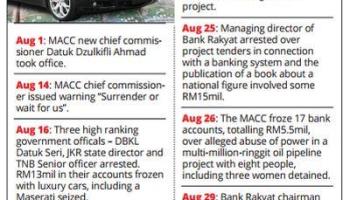The Star Says: A crisis of integrity and a lesson to be learnt
THE country’s gaze is fixed on the alleged corruption in the Sabah Water Department, following the arrest of two of its senior officers.
How can it not be when the Malaysian Anti-Corruption Commission (MACC) displayed at a press conference on Wednesday the cash, cars and luxury goods found in the duo’s homes and offices?
If a picture is worth a thousand words, imagine how much power there is in photographs of items worth tens of millions of ringgit.
And the numbers that the case has yielded so far are dizzying.
The MACC has seized about RM57mil in cash, nine cars (estimated value is RM3mil), 19.3kg of gold jewellery (RM3.6mil), almost 100 handbags (RM500,000) and 127 land title deeds.
The commission has also frozen bank accounts with balances totalling RM60mil.
It is certain that more assets will be uncovered as the probe deepens and widens.
There are additional figures to digest.
The MACC has discovered that the department had given contracts to 38 companies owned by family members and proxies of the two senior officers.
These contracts were awarded for projects funded by the Federal Government. In total, RM3.3bil was set aside for the projects.
The Star reported yesterday that 60 sen out of every ringgit thus allocated was pocketed by many individuals.
We marvel at the size of the MACC’s haul and we are outraged by the extent of the apparent theft of government funds, but we should also take note of another set of numbers.
According to 2015 statistics from the National Water Services Commission, which is better known as SPAN, 87.9% of Sabah’s population has treated water supply.
Only Kelantan has a lower water coverage (64%), although SPAN explained that many households in Kelantan relied on alternative water sources.
At the national level, 95.5% of the population has water coverage.
Sabah did just as poorly in the handling of non-revenue water (NRW), which is the difference between the water that comes out of the treatment plants and the water for which consumers are billed.
The gap is due to theft, leakage, burst pipes, faulty meters and maintenance works.
Last year, Malaysia’s NRW rate was 35.5%. Sabah’s rate was 55.1%, which again placed the state as second from the bottom.
Perlis was slightly worse, with 56.3%.
Yes, Sabah is large, and its rural communities are dispersed. But the same can be said about Sarawak, which has performed better in these areas of water supply management.
Whichever way you look at it, Sabah cannot claim to have a sparkling record in providing water to the people and in taking care of the water infrastructure. And now we can think of many million reasons why this is so.
The MACC investigations probably have some way to go, and if it leads to people being charged in court, a lot more will have to happen before the Sabah Water Department case can be put to rest.
Nevertheless, this is also a time for a compelling case study on how corruption directly hurts us.
Here is a great example of why we should all fight corruption. Underestimate its impact, and we may one day be left high and dry. Let us not waste this learning opportunity.
We have lately been fretting about being hit by a water crisis, but we should also understand that an integrity crisis is just as disruptive, debilitating and damaging. The Star Says
Related posts:
 Water fiasco: RM114 million seized from Sabah water officials
Water fiasco: RM114 million seized from Sabah water officials https://youtu.be/01stOYgM9x0 It was a record haul by the Malaysian Anti-Corruption Commission – RM114mil seized from two top officer...

No water but officials flush with funds: abuse of power, nepotism, cronyism, bribery and money laundering
Jabatan Air Negeri Sabah - http://malaysianlogo.blogspot.my/2014/06/jabatan-air-negeri-sabah-sabah.html KOTA KINABALU: Everywhere in Sab...

Jabatan Air Negeri - Customer Service How the millions were
stolen? 1. Contracts broken down to small packages of RM100,000 ea...
PBA in a fix over Penang water cut; billion litrea Water waste via leaky pipes
Jabatan Air Negeri - Customer Service How the millions were stolen? 1. Contracts broken down to small packages of RM100,000 ea...









